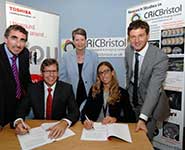The new echo-cardiography research project will identify the healthy limits of exercise and the wider benefits of exercise for children with congenital heart defects. Researchers will investigate fitness levels of 40 children born with a heart condition compared to 40 healthy child and adolescents, whilst exercising, which is when the heart is working harder. This will allow the researchers to investigate the heart performance under stress, to help with better identification of abnormalities, which sometimes do not present at rest. To date, echo cardiograms in children have traditionally been used while patients are at rest, making it more difficult to assess heart condition, performance and abnormality.
The aim of the project is to more precisely identify the safe levels of exercise for the children, as well as to clearly define the positive benefits that regular exercise delivers to children over time. The 80 children will be scanned over a period of months using state-of-the-art ultrasound scanning technology from Toshiba Medical Systems.
Dr Guido Pieles, Academic Clinical Lecturer in Paediatric Cardiology at the Bristol Congenital Heart Unit, said: “This is the first kind of research of its type in the UK. Our institutions have close ties with the NHS. It’s our aim that this clinical research benefits the NHS through better understanding of the role of exercise in life-long care for children born with congenital heart disease.
“Through this research we hope to improve scanning protocols and applications that will enable better, more precise and earlier diagnoses of heart function abnormalities and then to quickly identify effective treatment pathways for children with congenital heart disease. Additionally, we’ll also be able to better assess the benefits of exercise for children with obesity and other conditions caused by poor diet and sedentary lifestyles.”
Professor Craig Williams, Director of the Children’s Health and Exercise Research Centre (CHERC) at the University of Exeter, added: “This research project is exciting and much needed. This is a first step to a wider goal that looks at exercise as a good ‘medicine’ for sick children in general. Our work over 25 years has shown the physiological, psychological and social benefits exercise brings to children with a variety of conditions. It’s important for sick children to be able to play with their mates!
“This research will allow us to better identify how much activity and how often, as at present clinicians aren’t really sure what advice for children with certain conditions should be prescribed. The findings of this research will be a significant step forward for clinicians as care providers and wellbeing guides for the children with congenital heart disease, their families and carers.”
The research will be undertaken using Toshiba’s Aplio 500CV high-end ultrasound scanner. Its revolutionary High Density Architecture provides the researchers with clinical images of exceptional resolution and detail even while the child is exercising. Additionally, the system is equipped with a wide range of powerful clinical tools for advanced visualization, quantification and intervention for daily routines during this clinical research project.
The resulting applications could result in the development of procedures that ensure child patients have better, faster and safer journeys from scanning to treatment. Additionally the health service will benefit from the technology and understanding that might enable not only greater accuracy in defining paediatric patient pathways, but also cost savings produced by faster diagnosis and treatment.
Mark Hitchman, Managing Director, Toshiba Medical Systems, said; “It’s a very exciting project for us. We understand that when investigating child patients, non-invasive procedures are the norm. With that in mind, the scanning equipment is crucial, as everything related to the subject is smaller and more challenging than adult patients. As such, capturing detailed heart function images is very difficult.
“Our heritage in applied research and development means that we have developed the technical capabilities to be an important partner in research of this kind. We’re excited to see the initial results from our world class research partners and how the benefits can be passed on to the wider UK health system.”
Dr Chiara Bucciarelli Ducci, Co-Director of CRICBristol and Consultant Cardiologist at the BHI, concluded: “This is an incredibly important partnership between two renowned academic centres, and two very specialised NHS institutions such as the Bristol Children’s Hospital and the BHI and a world-class medical equipment manufacturer like Toshiba.
“At CRICBristol we try to act as a catalyst in fostering collaboration between the University and the NHS to improve healthcare delivery and promote best clinical practice. Having an important partner as Toshiba empowers us in achieving these goals.”
